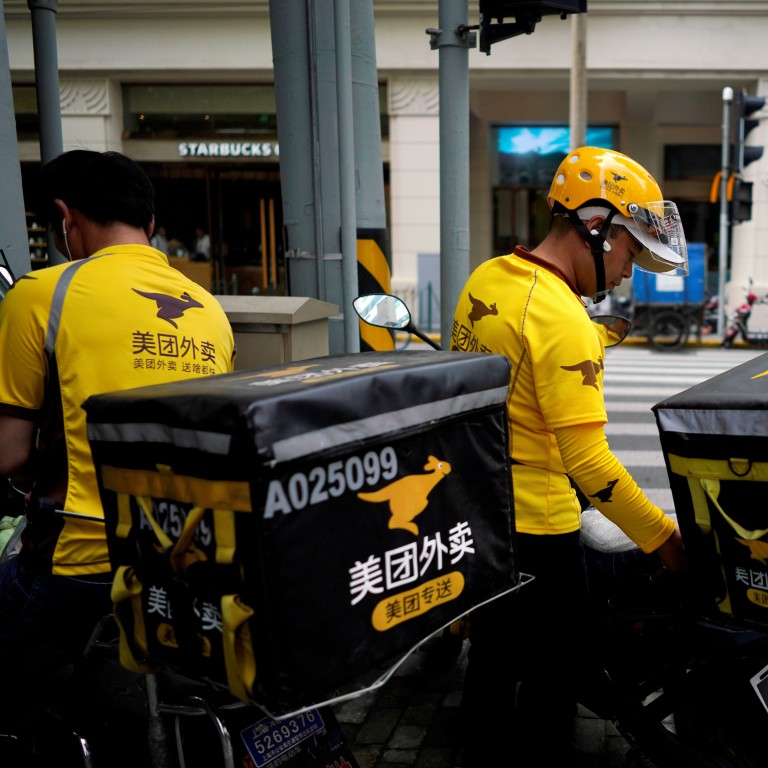
After-coronavirus stocks are red hot again as resurgence of epidemic and Hong Kong unrest spurs haven demand
- Tencent and Meituan climbed to record highs last week as the resurgence of the coronavirus rattles the US and protests roil Hong Kong
- New-economy stocks are long-term bets as they are set to benefit from times of uncertainty, Swiss wealth management firm UBP says
A resurgence of the coronavirus epidemic and social unrest in Hong Kong has been fuelling a fresh run-up in China’s new-economy stocks, spanning from gaming companies and online food delivery to biopharmaceuticals and networking.
Tencent Holdings, China’s social media juggernaut that runs businesses from mobile gaming to fintech, and Meituan Dianping, the nation’s biggest online platform of food delivery and bookings, both climbed to their record highs last week in Hong Kong. The ChiNext index of technology-heavy smaller companies trading in Shenzhen also rose to its highest level in four years.
New-economy stocks stand to benefit in multiple scenarios, according to Union Bancaire Privée (UBP), a Switzerland-headquartered private bank and wealth management firm. If the hostility between Beijing and Washington continues to be dialled up, China will need to boost spending on new infrastructure projects ranging from 5G networks to internal data centres. Meanwhile, the threat of a fresh outbreak of Covid-19 would prompt investors to pile into the stocks to shield from the economic fallout, said Anthony Chan, chief investment strategist for Asia at UBP.
“The tech, the internet tech, the education and also the medical innovations are really our high preference sectors, not only for the second half of this year, but also for the long term because they are really the priority areas in China for years to come,” he said.
When news of the coronavirus outbreak was first reported in China in January, traders loaded up on new-economy stocks, as stay-at-home orders led people to spend more time playing mobile games, order online food, and engage in virtual networking and remote conferences. Investors have continued to favour the sector.
Tencent rose 1.2 per cent to HK$524.50 on Friday, its highest close since its listing in 2004, and Meituan surged 6.9 per cent to HK$191.70, a record close since it went public in 2018. Alibaba Group Holding, which owns the South China Morning Post, added 3 per cent to HK$220.80 and Xiaomi, China’s biggest smartphone maker, gained 4.9 per cent to HK$14.26.
In the mainland, the ChiNext gauge of technology start-ups rose to its highest since January 2016, with drug makers Maccura Biotechnology and Pharmaron Beijing leading the rally over the past two months.
Even after the outsize gains, analysts are still upbeat and predict further gains in new economy stocks. Tencent had its share-price estimate raised to HK$592 by Jefferies Group recently because of the impending launch of a slew of blockbuster mobile games. The price targets for JD.com and NetEase imply that the stocks will rise at least 10 per cent from the current prices, according to Bloomberg data.
The pattern of chasing technology stocks falls in line with sentiment in the US, where the Nasdaq Composite Index closed at a record for two consecutive days before heading into the July 4 holiday weekend. Unparalleled liquidity unleashed by the Federal Reserve and the resurgence of the pandemic after the economy reopening have fuelled increased bets on US companies such as Tesla and Amazon.
While China has largely contained the coronavirus and the economy is showing signs of steady recovery, the risk of a fresh outbreak still looms. Tens of thousands of people in Beijing have been tested for Covid-19 after the virus broke out in a wholesale marketplace in the capital city last month and infected a few hundred people. The China-US ties and the political unrest in Hong Kong are also a focus of investors, with the police arresting more than 300 people who protested against the official enactment of a national security law in the city on July 1.
“The offline activities are still restricted and in a difficult time so the new-economy stocks will continue to benefit,” said Wang Chen, a partner at Xufunds Investment Management in Shanghai. “Their ability to ride out the epidemic was already ascertained and well reflected in the first-quarter reports. The stock prices can hold up well for long.”
Tencent probably posted a 23 per cent increase in second-quarter earnings, according to the estimates by 15 analysts tracked by Bloomberg. That compares with 6.2 per cent growth for the previous three-month period, when the companies on the Hang Seng Index averaged an 18 per cent profit decline. The social media giant is expected to release its interim report next month.
One major concern for investing in the new-economy stocks is the elevated valuations. Tencent is trading at the most expensive level relative to the Hang Seng Index in four years on the price-to-earnings ratio basis, while the valuation multiple for the ChiNext gauge also touched its highest since 2016.
Still, companies like Tencent deserve to be valued that high, as annual earnings growth of the social media giants is 36 percentage points above the market average, according to Changjiang Securities.
The new-economy sectors will boost China’s economy by 0.6 per cent in the short term, according to projections by Guotai Junan Securities.
New-economy stocks will probably lead the pack of gainers in the second half, while the outlook of the traditional companies rests on the strength of the economic recovery, said Wang Hanfeng, a strategist at China International Capital Corp.
“No matter how you spin it, this new-economy theme actually has a very strong fundamental reason to stay invested,” said Chan at UBP.
With additional reporting by Iris Ouyang.

